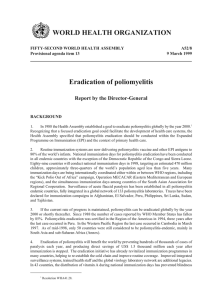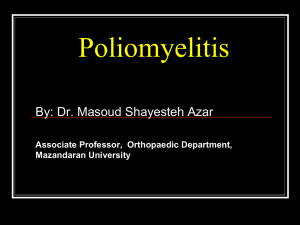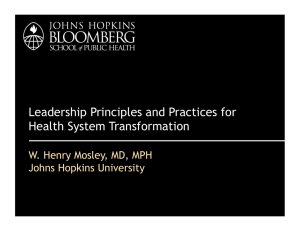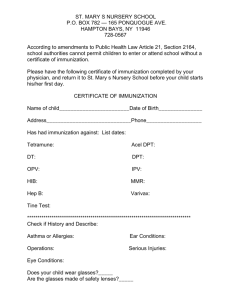Document 13443845
advertisement
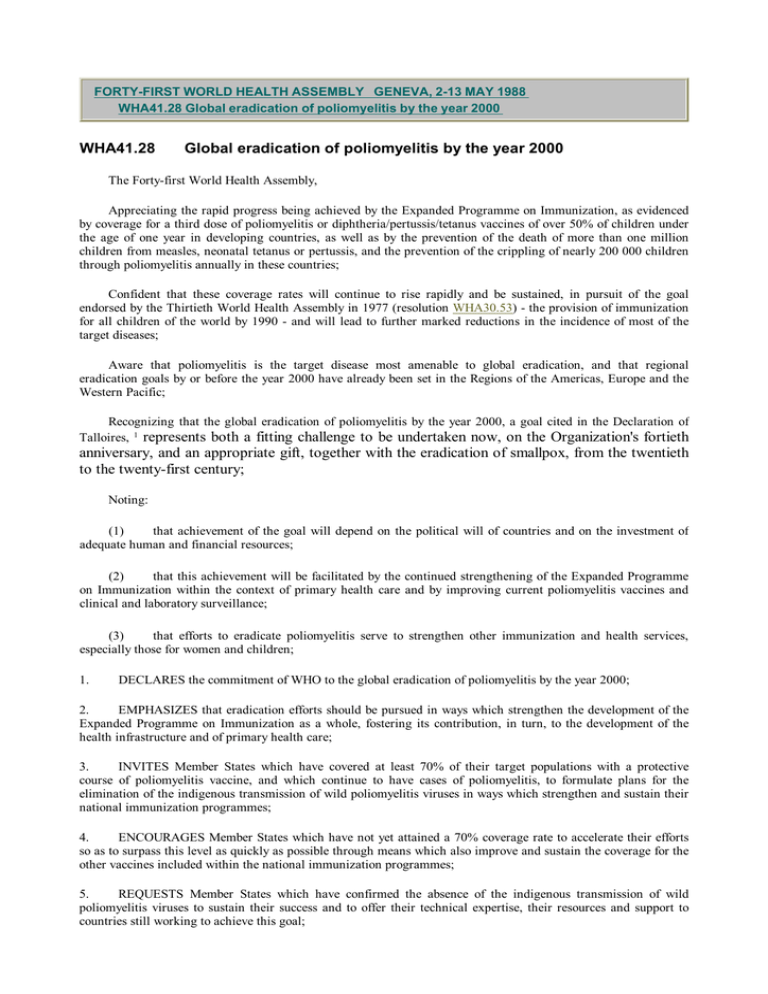
FORTY-FIRST WORLD HEALTH ASSEMBLY GENEVA, 2-13 MAY 1988 WHA41.28 Global eradication of poliomyelitis by the year 2000 WHA41.28 Global eradication of poliomyelitis by the year 2000 The Forty-first World Health Assembly, Appreciating the rapid progress being achieved by the Expanded Programme on Immunization, as evidenced by coverage for a third dose of poliomyelitis or diphtheria/pertussis/tetanus vaccines of over 50% of children under the age of one year in developing countries, as well as by the prevention of the death of more than one million children from measles, neonatal tetanus or pertussis, and the prevention of the crippling of nearly 200 000 children through poliomyelitis annually in these countries; Confident that these coverage rates will continue to rise rapidly and be sustained, in pursuit of the goal endorsed by the Thirtieth World Health Assembly in 1977 (resolution WHA30.53) - the provision of immunization for all children of the world by 1990 - and will lead to further marked reductions in the incidence of most of the target diseases; Aware that poliomyelitis is the target disease most amenable to global eradication, and that regional eradication goals by or before the year 2000 have already been set in the Regions of the Americas, Europe and the Western Pacific; Recognizing that the global eradication of poliomyelitis by the year 2000, a goal cited in the Declaration of Talloires, 1 represents both a fitting challenge to be undertaken now, on the Organization's fortieth anniversary, and an appropriate gift, together with the eradication of smallpox, from the twentieth to the twenty-first century; Noting: (1) that achievement of the goal will depend on the political will of countries and on the investment of adequate human and financial resources; (2) that this achievement will be facilitated by the continued strengthening of the Expanded Programme on Immunization within the context of primary health care and by improving current poliomyelitis vaccines and clinical and laboratory surveillance; (3) that efforts to eradicate poliomyelitis serve to strengthen other immunization and health services, especially those for women and children; 1. DECLARES the commitment of WHO to the global eradication of poliomyelitis by the year 2000; 2. EMPHASIZES that eradication efforts should be pursued in ways which strengthen the development of the Expanded Programme on Immunization as a whole, fostering its contribution, in turn, to the development of the health infrastructure and of primary health care; 3. INVITES Member States which have covered at least 70% of their target populations with a protective course of poliomyelitis vaccine, and which continue to have cases of poliomyelitis, to formulate plans for the elimination of the indigenous transmission of wild poliomyelitis viruses in ways which strengthen and sustain their national immunization programmes; 4. ENCOURAGES Member States which have not yet attained a 70% coverage rate to accelerate their efforts so as to surpass this level as quickly as possible through means which also improve and sustain the coverage for the other vaccines included within the national immunization programmes; 5. REQUESTS Member States which have confirmed the absence of the indigenous transmission of wild poliomyelitis viruses to sustain their success and to offer their technical expertise, their resources and support to countries still working to achieve this goal;
